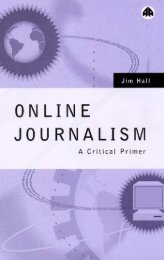Modul Mata Kuliah Journalisme Online - Ayo Menulis FISIP UAJY
Modul Mata Kuliah Journalisme Online - Ayo Menulis FISIP UAJY
Modul Mata Kuliah Journalisme Online - Ayo Menulis FISIP UAJY
You also want an ePaper? Increase the reach of your titles
YUMPU automatically turns print PDFs into web optimized ePapers that Google loves.
He writes in his book that he drank the participatory media Kool-Aid and started believing that a<br />
backlash against traditional news outlets and a democratization of media was essential.<br />
But it was in 2004, at a media counterculture summit in California, that Keen realized participatory<br />
media was, as he says, "useless." He worries that a rush of blogging is having deleterious effects on<br />
information consumption. But it's not the tools, he maintains; it's how people use them.<br />
"I'm not against the technology... I've got nothing against blogging, in itself, but it's always going to be<br />
second to professionals who get paid," Keen says. "I don't have a problem with people expressing<br />
themselves, but most of these are just electronic diaries."<br />
Does Keen have specific examples of sites that truly bother him?<br />
* YouTube: "(It) reflects the confusion of advertising and content. I'm troubled that this is becoming one<br />
long commercial break (with content and advertising combined)."<br />
* MySpace: "Adolescently sexualized chaos."<br />
* Wikipedia: "I'm troubled that I don't know who the editors are. If they revealed their editorial board,<br />
I'd be much more sympathetic."<br />
Keen concedes he has criticism of the mainstream media, too.<br />
"I acknowledge that the mainstream media is an ideal," Keen says. He's disturbed, he notes, by the<br />
shallower end of the pool, pointing to "American Idol" and other reality television shows.<br />
The debate about mainstream media is one of the most crucial points in the book. In a follow-up<br />
paperback version of "The Cult of the Amateur," due out in 2008, Keen will address the mainstream<br />
media more closely. He will also add a chapter on politics and re-work the introduction.<br />
He's a bit surprised by his book's audience. He says he's often pegged as a conservative but considers<br />
himself a liberal. And it's mostly liberals older than 40 who subscribe to his views. The reaction to his<br />
work, he says, has been explosive and has "touched very raw nerves" of people who both agree and<br />
disagree with him.<br />
Feedback to "The Cult of the Amateur" has been "extremely positive - remarkably positive." He claims<br />
that "it's having a massive impact around the world" and notes that teachers, parents and traditional<br />
media outlets have been most supportive.<br />
But participatory journalism and blogging can be effective, Keen admits, particularly at the local level.<br />
He points to the role blogging and the citizenry played in unearthing the Duke lacrosse scandal. But it's<br />
the stories larger in scope - he mentions Iraq and Walter Reed - that bloggers can't tackle.
















